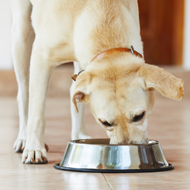Dogs adapted to digest starch 7,000 years ago, study finds

Researchers say this suggests human and canine genetics underwent similar changes.
New research suggests dogs acquired the ability to digest starch as early as 7,000 years ago, reflecting a change in their diet during the early stages of agricultural development.
Researchers led by Morgane Ollivier of the ENS de Lyon in France say this provides an example of the co-evolution of human and canine genes.
Previous research has shown that dogs produce extra copies of the gene Amy2B, which helps to digest starch. While most wolves produce two copies of the gene, dogs produce between four and 34 copies.
Researchers from ENS de Lyon, CNRS and MNHN wanted to find out when this began. Their findings were published this week in Royal Society Open Science.
Ancient DNA was extracted from the bones and teeth of 13 dog and wolf specimens, collected from archaeological sites in Europe and Turkmenistan, and dated between 4,000 and 15,000 years ago. An increase in Amy2B copies was seen as early as 7,000 years ago in south eastern Europe.
During the agricultural revolution thousands of years ago, there was a shift from hunting and gathering to farming, resulting in a significant increase in the human consumption of starchy foods, which was reflected by a gradual increase in copies of the starch-digesting gene Amy1.
Researchers say this suggests human and canine genetics underwent similar changes and parallels may yet be observed in the evolution of metabolism, immunity and brain processes.



 The Veterinary Medicines Directorate (VMD) is inviting applications from veterinary students to attend a one-week extramural studies (EMS) placement in July 2026.
The Veterinary Medicines Directorate (VMD) is inviting applications from veterinary students to attend a one-week extramural studies (EMS) placement in July 2026.